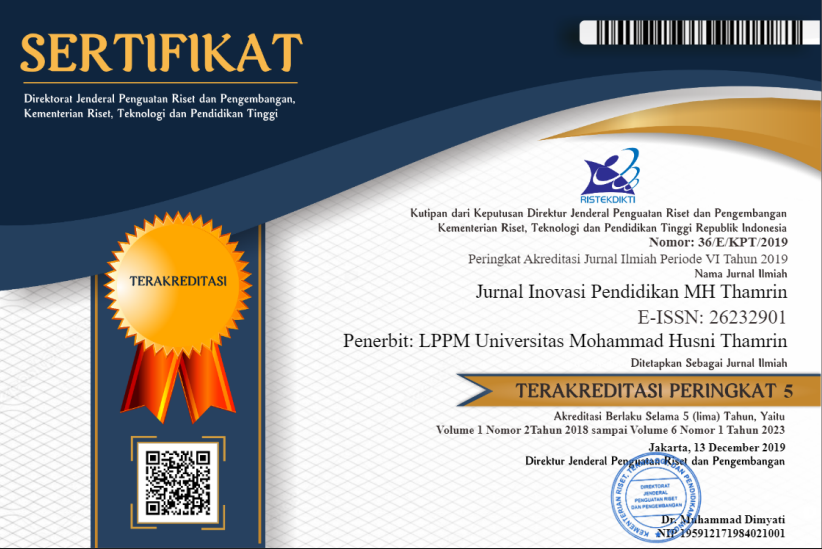Pendidikan Kesehatan tentang Pengetahuan Gizi Siswa di SMK
DOI:
https://doi.org/10.37012/jipmht.v6i2.1269Abstract
References
Afikah, A., Astuti, S. R. D., Suyanta, S., Jumadi, J., & Rohaeti, E. (2022). Mobile Learning in Science Education to Improve Higher-Order Thinking Skills (HOTS) and Communication Skills: A Systematic Review. International Journal of Advanced Computer Science and Applications, 13(7), 698–704. https://doi.org/10.14569/IJACSA.2022.0130782
Andrews, J. C., Netemeyer, R., Burton, S., & Kees, J. (2021). What consumers actually know: The role of objective nutrition knowledge in processing stop sign and traffic light front-of-pack nutrition labels. Journal of Business Research, 128, 140–155.
Collado, S., Staats, H., & Sancho, P. (2019). Normative Influences on Adolescents’ Self-Reported Pro-Environmental Behaviors: The Role of Parents and Friends. Environment and Behavior, 51(3), 288–314. https://doi.org/10.1177/0013916517744591
Davignon, L.-M., Poulin, F., & Denault, A.-S. (2022). Organized activities in adolescence and pro-environmental behaviors in adulthood: The mediating role of pro-environmental attitudes. Journal of Adolescence. https://doi.org/10.1002/jad.12113
Deguchi, M., Yokoyama, H., Hongu, N., Watanabe, H., Ogita, A., Imai, D., Suzuki, Y., & Okazaki, K. (2021). Eating perception, nutrition knowledge and body image among para-athletes: practical challenges in nutritional support. Nutrients, 13(9), 3120.
Gilardini, L., Cancello, R., Caffetto, K., Cottafava, R., Gironi, I., & Invitti, C. (2020). Nutrition knowledge is associated with greater weight loss in obese patients following a multidisciplinary rehabilitation program. Minerva Endocrinology, 46(3), 296–302.
Grønhøj, A., & Thøgersen, J. (2017). Why young people do things for the environment: The role of parenting for adolescents’ motivation to engage in pro-environmental behaviour. Journal of Environmental Psychology, 54, 11–19. https://doi.org/10.1016/j.jenvp.2017.09.005
Han, C. Y., Chan, C. G. B., Lim, S. L., Zheng, X., Woon, Z. W., Chan, Y. T., Bhaskaran, K., Tan, K. F., Mangaikarasu, K., & Chong, M. F.-F. (2020). Diabetes-related nutrition knowledge and dietary adherence in patients with Type 2 diabetes mellitus: A mixed-methods exploratory study. Proceedings of Singapore Healthcare, 29(2), 81–90.
Ivanović, M. (2014). Development of Media Literacy – An Important Aspect of Modern Education. Procedia - Social and Behavioral Sciences, 149, 438–442. https://doi.org/10.1016/j.sbspro.2014.08.284
Jayanti, Y. D., & Novananda, N. E. (2017). Hubungan pengetahuan tentang gizi seimbang dengan status gizi pada remaja putri kelas XI akuntansi 2 (di SMK PGRI 2 Kota Kediri). Jurnal Kebidanan, 6(2), 100–108.
Jenner, S. L., Devlin, B. L., Forsyth, A. K., & Belski, R. (2020). Assessing the nutrition knowledge of professional female Australian football (AFLW) athletes. Science and Medicine in Football, 4(3), 240–245.
Jezewska-Zychowicz, M., & Plichta, M. (2022). Diet Quality, Dieting, Attitudes and Nutrition Knowledge: Their Relationship in Polish Young Adults—A Cross-Sectional Study. International Journal of Environmental Research and Public Health, 19(11), 6533.
Nugraini, S. H., Choo, K. A., Hin, H. S., & Hoon, T. S. (2013). Students’ feedback of e-av biology website and the learning impact towards biology. Procedia - Social and Behavioral Sciences, 103, 860–869. https://doi.org/10.1016/j.sbspro.2013.10.408
Shimoda, A., Hayashi, H., Sussman, D., Nansai, K., Fukuba, I., Kawachi, I., & Kondo, N. (2020). Our health, our planet: a cross-sectional analysis on the association between health consciousness and pro-environmental behavior among health professionals. International Journal of Environmental Health Research, 30(1), 63–74. https://doi.org/10.1080/09603123.2019.1572871
Yusop, F. D., & Sumari, M. (2013). The Use of Social Media Technologies among Malaysian Youth. Procedia - Social and Behavioral Sciences, 103, 1204–1209. https://doi.org/10.1016/j.sbspro.2013.10.448
Downloads
Published
How to Cite
Issue
Section
Citation Check
License
Jurnal Inovasi Pendidikan MH Thamrin allows readers to read, download, copy, distribute, print, search, or link to the full texts of its articles and allow readers to use them for any other lawful purpose. The journal allows the author(s) to hold the copyright without restrictions. Finally, the journal allows the author(s) to retain publishing rights without restrictions Authors are allowed to archive their submitted article in an open access repository Authors are allowed to archive the final published article in an open access repository with an acknowledgment of its initial publication in this journal.

Jurnal Inovasi Pendidikan MH Thamrin is licensed under a Creative Commons Attribution 4.0 International License.











